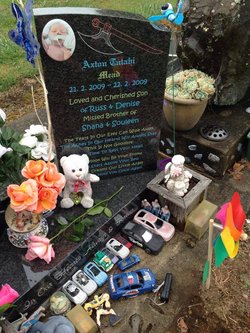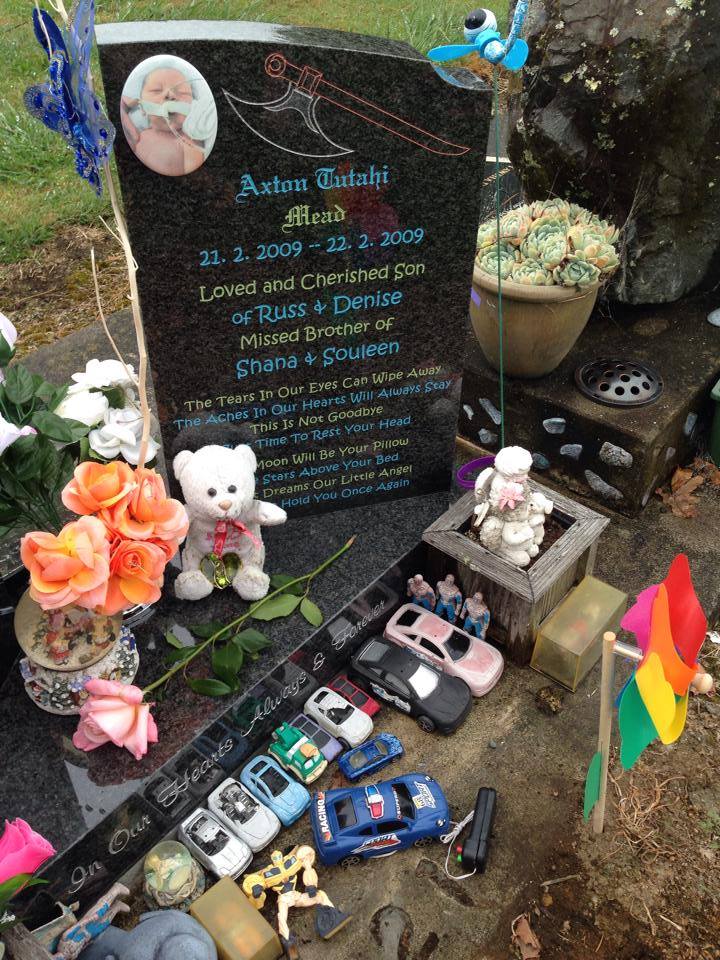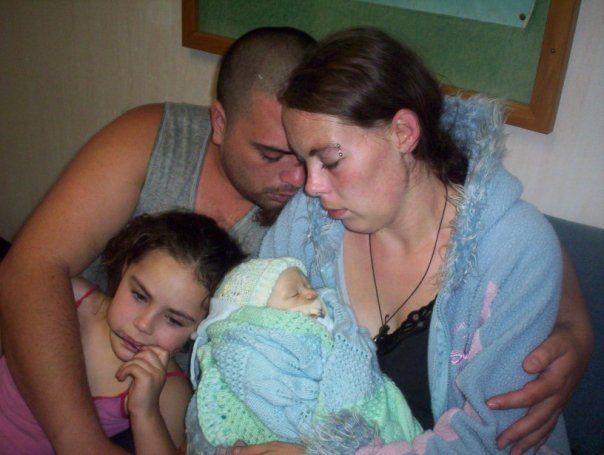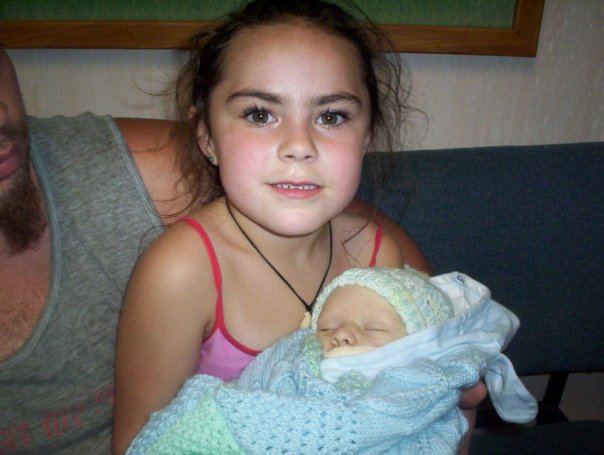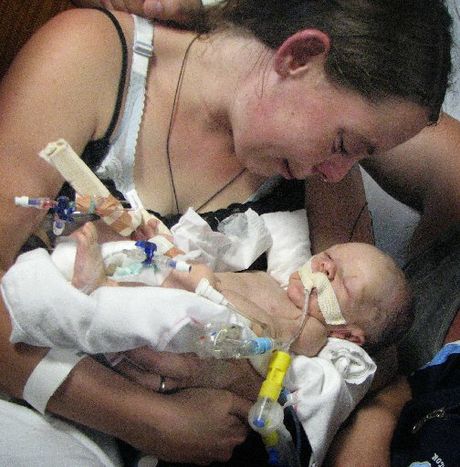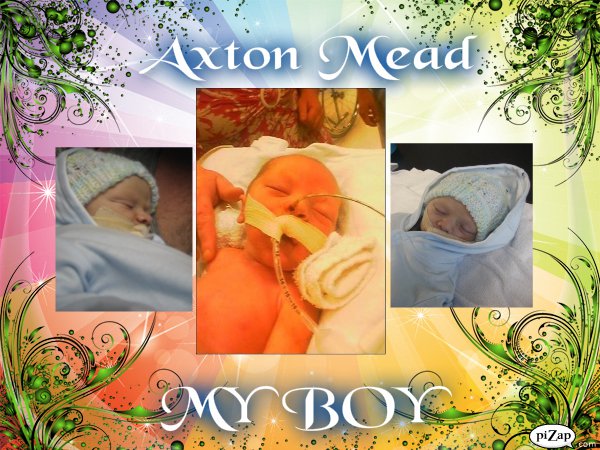Cause of Death
Asphyxiation
A Rotorua midwife has been criticised by a coroner over the death of a Rotorua baby and the baby's mother wants her licence revoked.
The midwife has admitted going against hospital policy and specialist advice.
Denise Simpson-Vogan held her only son Axton Tutahi Mead close to her and wept as she kissed him goodbye when he died a day after his birth.
Axton was not breathing when born at Rotorua Hospital on February 21, 2009 and died the next day at Waikato Hospital from perinatal asphyxia, with a haemorrhage on his brain and a background of foetal malnutrition.
Coroner Gordon Matenga found midwife Priscilla Punita's care during labour fell below expectations after she misread foetal heart or CTG monitoring records taken by maternity unit staff and removed the equipment. Axton may have lived had his heart rate been monitored throughout labour, according to the coroner.
In his findings he stated Mrs Punita undertook refresher training in fetal monitoring immediately following the baby's death, her practice was reviewed by the New Zealand Midwifery Council and she had been counselled and attended workshops on documentation and infant resuscitation.
Dr Matenga said he was satisfied nothing more needed to be done.
Mrs Punita told an inquest into the baby's death that recordings from monitoring equipment, referred to as tracings, didn't show any distress.
Ms Simpson-Vogan agreed to talk to The Daily Post about her experience because she said nobody should have to go through what she and her family had experienced.
"She shouldn't be delivering babies," she said of Mrs Punita.
"The pain never goes away. We live with it every day."
Her first child, Shana, now 7, was born by Caesarean and the inquest into Axton's death heard women who have had a Caesarean need to be monitored during subsequent labour in case their scar ruptures or the new baby gets distressed.
The decision to disconnect the monitor was crucial as tracings showed Axton's heart rate dropped considerably at least three times in the early stages of labour, Dr Matenga said.
The baby was born not breathing and with a haematoma on the top of his head with 30ml of blood in it following a 12-hour labour.
In evidence, Mrs Punita told the coroner she felt confident everything was normal but consultant obstetrician and gynaecologist Sylivia Rosevear, who was asked to review the case, stated the death could have been avoided had monitoring been done throughout labour.
Removing the monitoring equipment was against medical specialist advice and hospital policy, Dr Matenga said.
"Continous CTG monitoring throughout labour could have prevented the death of Axton. I say 'could have' deliberately as he was a compromised baby for reasons unknown and unrelated to the birth."
Ms Simpson-Vogan said she believed her son would have lived had his heart been monitored throughout labour.
"I did everything right. I went to the hospital to be monitored because I knew it had to be done ... I felt like we were being blamed."
She said when Mrs Punita removed the monitoring equipment she told the family it was unnecessary.
"She said she was the midwife and knew her job. I trusted her and I regret to this day I didn't say something."
Mrs Punita told the coroner she took the monitor off because Ms Simpson-Vogan wanted to keep active while in labour. Ms Simpson-Vogan disputed this and Dr Matenga accepted her version of events.
Ms Simpson-Vogan has since had another child, a healthy baby girl named Souleen.
Mrs Punita said she couldn't speak about the case as she was bound by confidentiality.
"They must be going through a lot. I feel we must respect the grieving process for them. It is unfortunate this has happened," she said.
The New Zealand Council of Midwifery refused to comment. A Lakes District Health Board spokeswoman said the case was referred to the coroner for investigation.
Cause of Death
Asphyxiation
A Rotorua midwife has been criticised by a coroner over the death of a Rotorua baby and the baby's mother wants her licence revoked.
The midwife has admitted going against hospital policy and specialist advice.
Denise Simpson-Vogan held her only son Axton Tutahi Mead close to her and wept as she kissed him goodbye when he died a day after his birth.
Axton was not breathing when born at Rotorua Hospital on February 21, 2009 and died the next day at Waikato Hospital from perinatal asphyxia, with a haemorrhage on his brain and a background of foetal malnutrition.
Coroner Gordon Matenga found midwife Priscilla Punita's care during labour fell below expectations after she misread foetal heart or CTG monitoring records taken by maternity unit staff and removed the equipment. Axton may have lived had his heart rate been monitored throughout labour, according to the coroner.
In his findings he stated Mrs Punita undertook refresher training in fetal monitoring immediately following the baby's death, her practice was reviewed by the New Zealand Midwifery Council and she had been counselled and attended workshops on documentation and infant resuscitation.
Dr Matenga said he was satisfied nothing more needed to be done.
Mrs Punita told an inquest into the baby's death that recordings from monitoring equipment, referred to as tracings, didn't show any distress.
Ms Simpson-Vogan agreed to talk to The Daily Post about her experience because she said nobody should have to go through what she and her family had experienced.
"She shouldn't be delivering babies," she said of Mrs Punita.
"The pain never goes away. We live with it every day."
Her first child, Shana, now 7, was born by Caesarean and the inquest into Axton's death heard women who have had a Caesarean need to be monitored during subsequent labour in case their scar ruptures or the new baby gets distressed.
The decision to disconnect the monitor was crucial as tracings showed Axton's heart rate dropped considerably at least three times in the early stages of labour, Dr Matenga said.
The baby was born not breathing and with a haematoma on the top of his head with 30ml of blood in it following a 12-hour labour.
In evidence, Mrs Punita told the coroner she felt confident everything was normal but consultant obstetrician and gynaecologist Sylivia Rosevear, who was asked to review the case, stated the death could have been avoided had monitoring been done throughout labour.
Removing the monitoring equipment was against medical specialist advice and hospital policy, Dr Matenga said.
"Continous CTG monitoring throughout labour could have prevented the death of Axton. I say 'could have' deliberately as he was a compromised baby for reasons unknown and unrelated to the birth."
Ms Simpson-Vogan said she believed her son would have lived had his heart been monitored throughout labour.
"I did everything right. I went to the hospital to be monitored because I knew it had to be done ... I felt like we were being blamed."
She said when Mrs Punita removed the monitoring equipment she told the family it was unnecessary.
"She said she was the midwife and knew her job. I trusted her and I regret to this day I didn't say something."
Mrs Punita told the coroner she took the monitor off because Ms Simpson-Vogan wanted to keep active while in labour. Ms Simpson-Vogan disputed this and Dr Matenga accepted her version of events.
Ms Simpson-Vogan has since had another child, a healthy baby girl named Souleen.
Mrs Punita said she couldn't speak about the case as she was bound by confidentiality.
"They must be going through a lot. I feel we must respect the grieving process for them. It is unfortunate this has happened," she said.
The New Zealand Council of Midwifery refused to comment. A Lakes District Health Board spokeswoman said the case was referred to the coroner for investigation.
